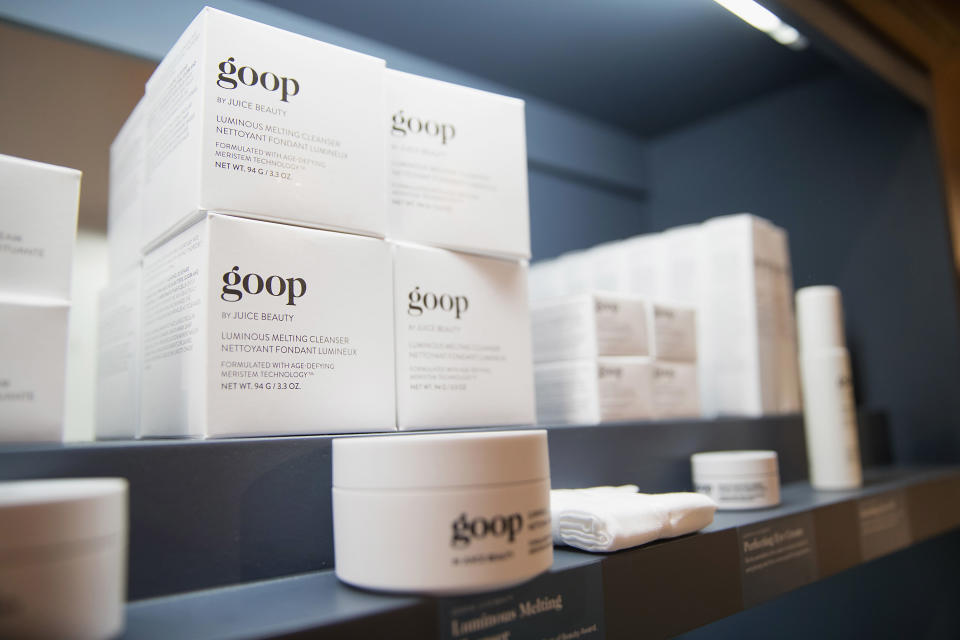Goop has been reported to U.K. officials for allegedly breaching advertising law
Goop, the lifestyle brand pioneered by Gwyneth Paltrow, has been reported to regulators in the U.K. for 113 alleged breaches of the country’s advertising law. One product in particular was mentioned: the Mother Load, a vitamin regimen that Goop markets to pregnant women.
The Good Thinking Society, a charity that promotes scientific thinking, was the organization that reported Goop, the Times says. It is in fact accusing Goop of issuing “potentially dangerous” advice regarding “unproven” health products.
The Mother Load, which retails on Goop’s website at $90 for a one-month supply, is touted as a “top-of-the-line natal protocol” that can be taken either “prior to conception” or during pregnancy. On the page describing it, Goop also claims the supplements provide “extra support for getting new and not-so-new moms back on their feet.”
At issue is the Mother Load’s vitamin A content. Each daily packet contains 5,500 IU of vitamin A, in two forms — one, retinyl palmitate (1,500 IU or 450 micrograms), an antioxidant chemical compound that converts to vitamin A; the other, beta-carotene (4,000 IU or 1,200 micrograms), a natural carotenoid that may or may not convert to vitamin A in the body. And that total, 5,500, is 1,500 IU more than many popular prenatal vitamins, such as One a Day Women’s Prenatal, which contains 1,200 micrograms of vitamin A (with 50 percent of it sourced from beta-carotene).
“For pregnant women, too much vitamin A can cause liver toxicity and birth defects in a developing baby,” women’s health expert Jennifer Wider, MD, tells Yahoo Lifestyle.
The American College of Obstetricians and Gynecologists (ACOG) recommends that pregnant women strive to get between 750 and 770 micrograms of vitamin A a day, which helps to grow the bones of a developing fetus and promotes healthy skin and eyesight. Even better, though, according to ACOG, is if expectant women can get their vitamin A from natural food sources, such as carrots, green leafy vegetables, and sweet potatoes.

One piece of pumpkin pie, for example, provides 3,743 IU of vitamin A, or 249 percent of your daily value of the vitamin, according to the National Institutes of Health. It’s why taking a supplement that’s high in vitamin A while also eating a diet high in the vitamin could be a bit much. (However, Wider says, doctors are usually more concerned about mega-dosing with supplements alone.)
Goop insists that while Mother Load may contain more vitamin A than other brands, there is no risk. “When used as recommended, Goop’s the Mother Load supplements are safe during pregnancy,” Susan Beck, Goop’s senior vice president of science and research, tells Yahoo Lifestyle. “The Mother Load contains a very moderate 450 micrograms (1,500 IU) of vitamin A as retinyl palmitate,” she says, noting that it’s less than the U.K.’s National Health Service’s recommended daily intake of 600 mcg per day.
“The 4,000 IU beta-carotene included in Mother Load is only converted in the body to vitamin A as needed, and there is no safety concern for eating this, as there would be no safety concern for eating a large number of carrots containing beta-carotene,” she continues. “The Mother Load package contains a warning that pregnant women should not consume more than 10,000 IU vitamin A daily, due to risk of birth defects.”
Beck adds that “all pregnant women need vitamin A” and that “the concern is that pregnant women not consume excessive vitamin A … moderation is the best policy.”
Beta-carotene can be a “precursor” (a substance the body converts) to vitamin A, Christine Greves, MD, a board-certified ob-gyn at the Winnie Palmer Hospital for Women and Babies, tells Yahoo Lifestyle. But as far as what’s getting converted and utilized, she says, “there can be some variation in that from person to person.”
Most doctors, in general, would caution about taking more than 5,000 IU of vitamin A, Greves says. “That accounts for a regular, healthy diet,” she explains. “We assume you’re going to have some carrots or a slice of pumpkin pie here and there.” The big concern is when a person’s vitamin A intake exceeds 10,000 IU, she says, adding, “That’s when it gets teratogenic, meaning it could affect the developing baby in a negative way.”
If you’re pregnant and not sure about your vitamin A intake, talk to your doctor. Says Wider, “Usually prenatal vitamins that adhere to the recommended daily allowance are formulated to meet all of the needs of a pregnant women.”
Read more from Yahoo Lifestyle:
Meghan Markle’s comparison of pregnancy to jet lag is apt, say experts
Prince Harry introduces pregnant Meghan Markle to his 98-year-old superfan during Australia tour
Follow us on Instagram, Facebook, and Twitter for nonstop inspiration delivered fresh to your feed, every day.
